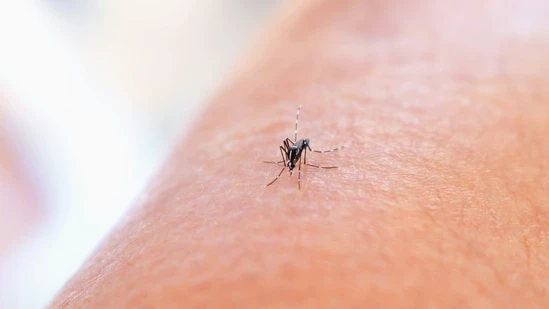As we observe World Mosquito Day on August 20, 2025, it’s time to reflect on the actual impact these tiny insects have on our health.
For many, a mosquito bite may seem like nothing more than a minor nuisance – a little red bump that itches for a few days before fading away. However, the reality is far more complex and may lead to serious health consequences. Mosquitoes are not just bothersome pests; they are some of the most dangerous disease carriers in the world, earning their spot as one of the “deadliest animals” according to the World Health Organization.
Why do mosquitoes bite?
It is important to understand why mosquitoes bite us in the first place. When a female mosquito bites, she pierces the skin to harvest blood, which is necessary for egg production. As she feeds, her saliva enters our bloodstream. This saliva contains proteins that prevent blood clotting, triggering an immune response in our bodies, as reported in the journal Biomolecules. The result? Those familiar signs of irritation: redness, swelling, and intense itching.
“For some, this irritation is merely a mild inconvenience. But for others, the immune response can be severe, resulting in larger welts or even allergic reactions. It’s fascinating – and a bit unsettling – to think about how something so small can provoke such varied responses in different individuals,” Dr Tushar Tayal, Internal Medicine, CK Birla Hospital, tells Health Shots.
What are the dangers of mosquito bites?
While the immediate discomfort of a bite may be annoying, the hidden dangers mosquitoes pose are far more alarming. Various species of mosquitoes carry dangerous pathogens and parasites that contribute to multiple diseases, according to research published by Baylor College of Medicine.
Dr Tushar Tayal shares some of the most significant illnesses linked to mosquito bites, including:
- Dengue: Transmitted by the Aedes aegypti mosquito, dengue fever is rapidly spreading, particularly in tropical regions such as India. Symptoms include high fever, severe body aches, and rashes. They can lead to severe complications like bleeding and shock.
- Malaria: This disease, caused by a parasite transmitted through Anopheles mosquitoes, continues to be a significant health issue, affecting thousands every year. Symptoms range from recurring fevers and chills to organ damage in severe cases.
- Chikungunya: Another disease caused by Aedes mosquitoes, chikungunya is infamous for causing debilitating joint pain that can persist for weeks or even months.
- Japanese encephalitis: While less prevalent, this virus impacts the brain, leading to severe symptoms such as seizures and swelling, which can be fatal, according to the National Institute of Neurological Disorders and Stroke.
- Zika virus: Zika gained global attention in 2015 for its effects on pregnancy, as infections during this time can result in severe congenital disabilities in newborns.
“These illnesses often present symptoms that mimic those of mild viral infections, making it easy for individuals to overlook their seriousness in the initial stages. The potential for misdiagnosis can lead to significant health risks if not addressed promptly,” says Dr Tayal.
Who is most at risk of severe outcomes from vector-borne diseases?
While anyone can be affected by mosquito-borne illnesses, certain groups are at a heightened risk. According to the World Health Organization, this includes:
- Children: Their developing immune systems can react more aggressively, making diseases like dengue particularly life-threatening.
- Older adults: With age comes a natural decline in immune function, increasing vulnerability.
- Pregnant women: They face unique risks, particularly with diseases like Zika, which can severely affect fetal development.
- Immunocompromised individuals: Those with weakened immune systems are more prone to severe forms of these infections.
Additionally, some people might experience heightened reactions to mosquito bites, such as “skeeter syndrome,” characterised by excessive swelling, pain, and even fever, according to the International Journal of Health Sciences and Research. “Though rare, these allergic responses can transform a simple bite into a significant health concern”, states Dr Tayal.
What are the preventive measures against diseases spread by mosquitoes?
Fortunately, many diseases transmitted by mosquitoes are preventable with consistent precautionary measures, as recommended by the Centres for Disease Control and Prevention.
Here are some effective methods to minimise the risk:
- Eliminate breeding spots: Mosquitoes thrive in stagnant water. Make a habit of regularly emptying and cleaning coolers, flowerpots, and buckets. Even something as small as a bottle cap filled with water can serve as a breeding ground for bacteria.
- Use physical barriers: Install window screens, use bed nets, and wear mosquito-proof clothing, especially during dusk and dawn when mosquitoes are most active.
- Repellents matter: Both chemical and natural repellents can help deter mosquitoes. Apply them to exposed skin or use coils and vaporisers indoors to reduce bites effectively.
- Community efforts: Large-scale initiatives, such as fogging, sanitation drives, and public awareness campaigns, play a critical role in addressing the mosquito problem beyond individual households.
As we observe World Mosquito Day in 2025, we must remember that the danger from mosquitoes isn’t just the itch. Protecting ourselves from these bites is not only about comfort; it’s a vital aspect of safeguarding our long-term health.
